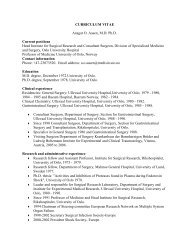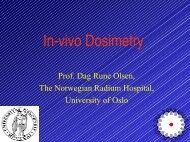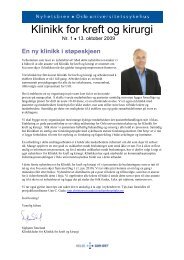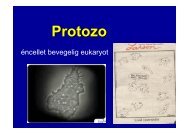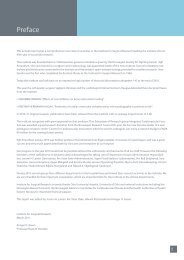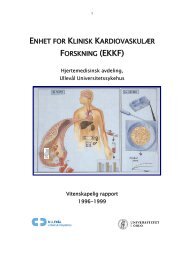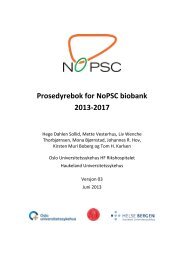Novel genetic and epigenetic alterations in ... - Ous-research.no
Novel genetic and epigenetic alterations in ... - Ous-research.no
Novel genetic and epigenetic alterations in ... - Ous-research.no
You also want an ePaper? Increase the reach of your titles
YUMPU automatically turns print PDFs into web optimized ePapers that Google loves.
IntroductionThe genes <strong>in</strong>volved <strong>in</strong> ma<strong>in</strong>ta<strong>in</strong><strong>in</strong>g homeostatis has traditionally been divided <strong>in</strong>to twocategories, proto-oncogenes <strong>and</strong> tumor suppressor genes. Mutations or chromosomalrearrangements may either activate oncogenes, caus<strong>in</strong>g them to drive e.g. cell proliferationeven <strong>in</strong> absence of proliferative signals, <strong>and</strong>/or <strong>in</strong>activate tumor-suppressor genes, lead<strong>in</strong>g todestruction of important checkpo<strong>in</strong>ts at which the cell may have time to perform DNArepair, align chromosomes or just wait for the beneficial environmental conditions for cellproliferation. Additionally, ma<strong>in</strong>tenance genes, or stability genes, are important forhomeostasis. Under <strong>no</strong>rmal circumstances these genes keep the <strong>genetic</strong> errors <strong>in</strong> the cell to am<strong>in</strong>imum[13]. The fact that 30% of our genes encode prote<strong>in</strong>s <strong>in</strong>volved <strong>in</strong> regulat<strong>in</strong>g theDNA fidelity clearly shows the importance of these stability genes[14].The impact of epi<strong>genetic</strong>s on tumorigenesis is <strong>no</strong>w widely demonstrated, <strong>and</strong> it is reckonedto play just as an important role <strong>in</strong> tumor development as <strong>genetic</strong>s[15]. Promoterhypermethylation is a well k<strong>no</strong>wn mechanism which may cause reduced or absence ofexpression of tumor suppressor <strong>and</strong> DNA repair genes while hypomethylation may activatea proto-oncogene <strong>in</strong>to an oncogene[16]. As of this, both ge<strong>no</strong>me wide hypomethylation, <strong>and</strong>gene specific hypermethylation are <strong>in</strong>volved <strong>in</strong> colorectal tumorigenesis[17].DNA mutations <strong>in</strong> cancerMutations <strong>in</strong>clude all stable, irreversible changes that alter the primary DNA sequence, <strong>and</strong>are seen <strong>in</strong> less than 1% of a population. Today the term “mutation” is often thought of assubtle sequence <strong>alterations</strong> such as base substitutions <strong>and</strong> small <strong>in</strong>sertions <strong>and</strong> deletions(<strong>in</strong>dels), but <strong>in</strong> <strong>genetic</strong>s, gross chromosomal <strong>alterations</strong> such as chromosomal translocations,gene amplifications, large gene deletions, <strong>and</strong> ga<strong>in</strong>s <strong>and</strong> losses of large chromosomalstretches were also <strong>in</strong>cluded <strong>in</strong> the term, <strong>and</strong> that the gross <strong>and</strong> subtle changes were twodifferent classes of mutations[18]. The different types of mutations <strong>and</strong> their tim<strong>in</strong>g <strong>in</strong> thecell cycle are illustrated <strong>in</strong> Figure 2. There are different categories of subtle mutations: po<strong>in</strong>tmutation, def<strong>in</strong>ed by the exchange of a s<strong>in</strong>gle base, <strong>in</strong>cludes both missense mutations(exchange of a base giv<strong>in</strong>g an am<strong>in</strong>o acid change) which can affect prote<strong>in</strong> fold<strong>in</strong>g <strong>and</strong>function, <strong>and</strong> <strong>no</strong>n-sense mutations (exchange of a base which <strong>in</strong>serts a prematureterm<strong>in</strong>ation codon) lead<strong>in</strong>g to a truncated prote<strong>in</strong>. If a po<strong>in</strong>t mutation does <strong>no</strong>t give an13





